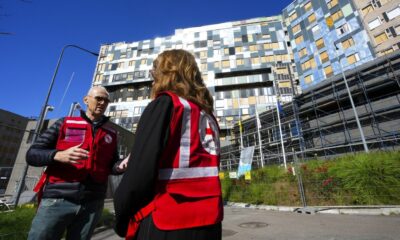World
NDP Government Dismisses Nanaimo’s Call for Sober Housing Solutions

The British Columbia New Democratic Party (NDP) government has dismissed a request from Nanaimo’s city council to convert a proposed supportive housing project on Terminal Avenue into a sober living facility. This decision reflects ongoing tensions between provincial authorities and local leaders regarding addiction and housing policies.
Nanaimo Mayor Leonard Krog emphasized the need for a safe environment for individuals seeking to overcome addiction. He stated, “In order to save lives you have to provide safe places for people.” Krog’s comments came after residents voiced concerns about the current facility, which they claim has become a center for open drug use and violence.
The city’s request for the supportive housing project to focus on sobriety was not received positively by Christine Boyle, the provincial Minister of Housing. Boyle reiterated the government’s stance, arguing that a relapse is a common part of the recovery process. “What we don’t want is for people who have a relapse to lose their housing and go through the destabilizing impacts that can continue to have,” she told the CBC.
This issue is not new for Nanaimo. Residents have expressed frustration with the lack of promised support services tied to the Terminal Avenue site. Concerns about safety, drug trafficking, and community intimidation have persisted. In one account shared by Discourse, a senior resident reported feeling unsafe due to the prevailing culture of drug use and violence around the facility.
Despite these concerns, Boyle maintained that the NDP government remains committed to a “housing-first model.” This approach allows for the presence of drug and alcohol use in provincial facilities to help individuals transition off the streets. Her insistence on this model has not resonated well with Krog or the local community.
The provincial government’s history with Nanaimo has been marked by dismissals of community input. Just last month, when the council debated shutting down an overdose prevention site near city hall, the health authority and the premier defended the facility against local discontent. Krog’s past criticisms of the province’s decriminalization policy have also gone unacknowledged, as the government countered his assertions with a firm denial.
Boyle’s lectures to Nanaimo leaders have led to increasing frustration. Krog, a former NDP MLA, expressed disappointment with the government’s response to local needs. He urged the province to broaden its perspective, advocating for a balanced consideration of community safety and support for those trying to regain control of their lives.
The NDP’s approach has often appeared reactive rather than proactive. Following a narrow electoral victory in the previous spring, the government has shown signs of returning to its previous stance of dismissing local concerns.
Krog’s advocacy for involuntary care for individuals with severe mental health challenges in 2020 was met with resistance from the NDP, which argued against such measures. Nonetheless, the irony remains that the government has eventually shifted its position on several contentious issues, often out of electoral pressure rather than genuine community engagement.
As Nanaimo navigates its ongoing struggle with addiction and support services, the city remains steadfast in advocating for changes that reflect the needs of its residents. The provincial government, on the other hand, continues to uphold its policies, raising questions about its commitment to truly listening to the communities it serves.
Rob Shaw, a seasoned political journalist, continues to report on these developments through CHEK News and other platforms, providing critical analysis of the evolving landscape of B.C. politics.
-

 Politics4 weeks ago
Politics4 weeks agoSecwepemc First Nation Seeks Aboriginal Title Over Kamloops Area
-

 World5 months ago
World5 months agoScientists Unearth Ancient Antarctic Ice to Unlock Climate Secrets
-

 Entertainment5 months ago
Entertainment5 months agoTrump and McCormick to Announce $70 Billion Energy Investments
-

 Science5 months ago
Science5 months agoFour Astronauts Return to Earth After International Space Station Mission
-

 Lifestyle5 months ago
Lifestyle5 months agoTransLink Launches Food Truck Program to Boost Revenue in Vancouver
-

 Technology3 months ago
Technology3 months agoApple Notes Enhances Functionality with Markdown Support in macOS 26
-

 Lifestyle3 months ago
Lifestyle3 months agoManitoba’s Burger Champion Shines Again Amid Dining Innovations
-

 Top Stories2 months ago
Top Stories2 months agoUrgent Update: Fatal Crash on Highway 99 Claims Life of Pitt Meadows Man
-

 Politics4 months ago
Politics4 months agoUkrainian Tennis Star Elina Svitolina Faces Death Threats Online
-

 Sports5 months ago
Sports5 months agoSearch Underway for Missing Hunter Amid Hokkaido Bear Emergency
-

 Politics5 months ago
Politics5 months agoCarney Engages First Nations Leaders at Development Law Summit
-

 Technology5 months ago
Technology5 months agoFrosthaven Launches Early Access on July 31, 2025





















